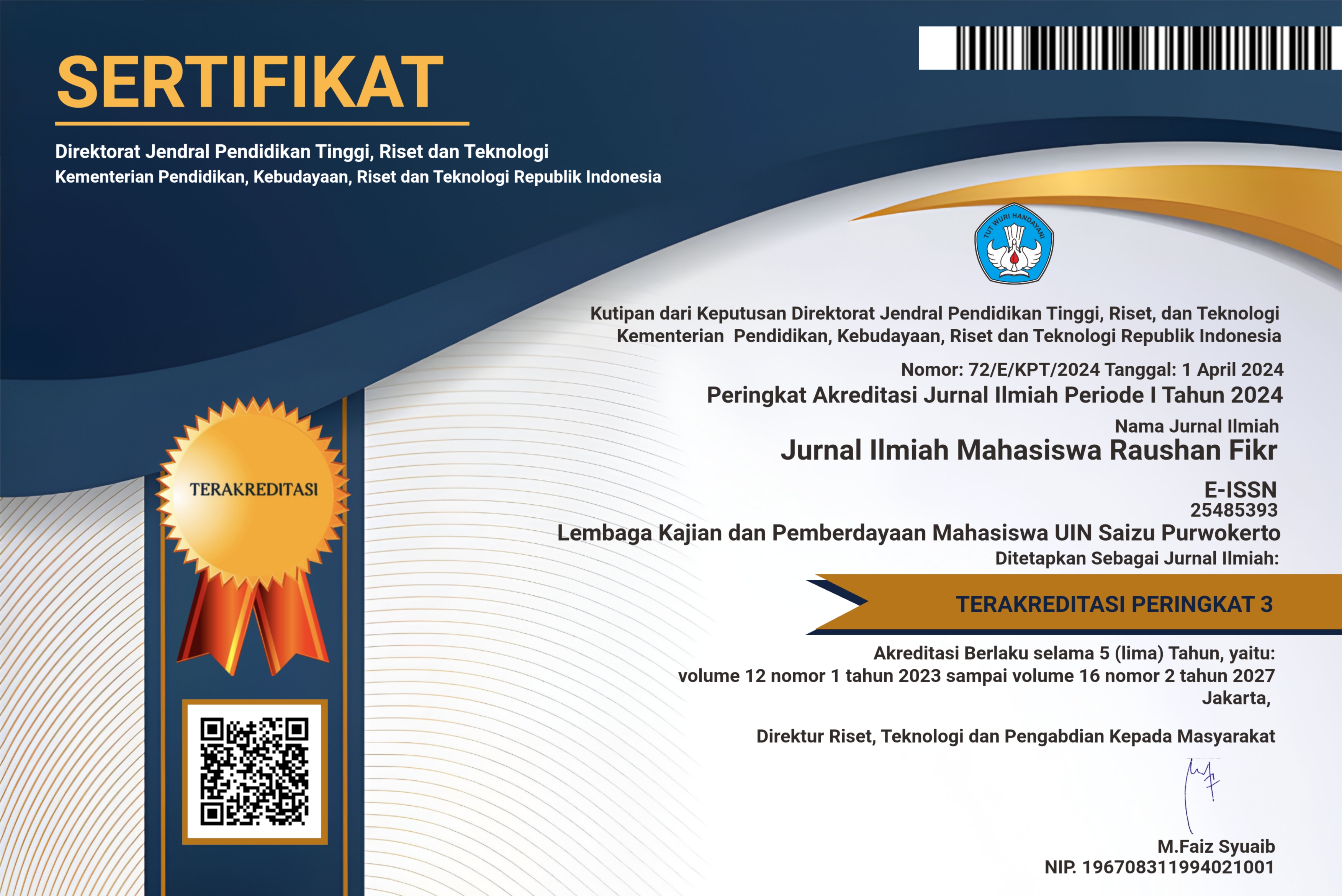Pembenahan Karakter Wirausahawan Indonesia Melalui Konsep Islamic Entrepreneurship
DOI:
https://doi.org/10.24090/jimrf.v3i1.1010Keywords:
Character, Islamic EntrepreneurshipAbstract
The pillars that prop up the existence of nation is character the nation it self, in other hand ruin of the nations is indicated with the moving of cultural configuration and also wisdom values that are not wanted by the establisher. The Formation of Indonesia Entrepreneurship character can be done with Entrepreneurship concept that input Islamic values in the application. Beside it, character also will related to the thing that affect, the example that character is formed from environment, education or training.Downloads
References
Amrin Abdullah, 2006. Asuransi Syariah Jakarta: Gramedia.
Bambang Trim, 2009. Briliant Enterpreneur Muhammad saw. Bandung: Salamadani.
Chandra, WW Hendro, 2006. Be A Smart and Good Entrepreneur, edisi ke-1,CLA Jakarta: Publishing.
Ciputra, 2013. Ciputra Quantum Leap: Entrepreneurship Mengubah Masa Depan Bangsa dan Masa Depan Anda Jakarta: Kelompok Gramedia.
Ermawati, tuti. n.d. Kewirausahaan dalam Islam. Pustaka LIPI E-Library
Husen Achmad, Dr., M.Pd, et al. 2010. Model Pendidikan Karakter Bangsa.
IRWAN.S, Prinsip pendidikan karakter, UPTD Dinas Pendidikan Kecamatan Balusu Kabupaten Barru.
Kirzner, I. M., 1973. Competition & Entrepreneurship Chicago: The University of Chicago Press.
Marzuki Usman, 2006. Kewirausahaan, Pedoman Praktis: Kiat dan Proses Menuju Sukses, Jakarta: Salemba Empat.
M. Athiyah al-Abrasy, 1984. Keagungan Muhammad Rasulullah, terj. Muhammad Tahir dan Abu Laila Jakarta: Pustaka Jaya.
Pradhita Selly, 2009. “Kajian Karakteristik Entrepreneurship UMKM Dalam Pengembalian Dana Bergulir PKBL Mitra Binaan Perum Pegadaian Di Kota Padangâ€, Skripsi Program Studi Manajemen Fakultas Ekonomi Universitas Andalas Padang.
Paulsson Thomas dan Charlie Karlsson, Entrepreneurship and Economic Growth (A Critical review of Empirical and Theoretical Research), ITPS, Institutet för tillväxtpolitiska studier.
Runge, I., 2000. Capital and Uncertainty, Edward Elgar, CheltenhamUK.
Sarwoko Endi, Kajian Empiris Entrepreneur Intention Mahasiswa, Program Studi Manajemen Universitas Kanjuruhan Malang
Shuhairimi Bin Abdullah, The Characteristics of Successful Entrepreneurs from Islamic Perspective, Center for CommunicationTechnology and Human Development University Malaysia Perlis,
Thorik Gunara dan Utus Hardiono Sudibyo, 2007. Markering Muhammad:
Strategi Handal dan Jitu Praktik Bisnis Nabi Muhammad SAW. Bandung: Salamandai Pustaka Semesta.
Yazilmiwati Yaacob and Ilhaamie Abdul Ghani Azmi, Entrepreneurs’ Personality from Islamic Perspective: A Study of Successful Muslim Entrepreneurs in Malaysia, Department of Syariah and Management, Academy of Islamic Studies, University of Malaya
Zaroni Akhmad Nur, Bisnis Dalam Perspektif Islam: Telaah Aspek Keagamaan dalam Kehidupan Ekonomi.
Http://Id.Berita.Yahoo.Com/Karakter-Ekonomi-Perlu-Dibangun-Bagi-Generasi-Muda-235815783.Html, diakses tanggal 03 Januari 2014.
Kuliah umum dialog antariman di San Fransisco, Kalifornia, pada Senin (25/11) waktu setempat atau Selasa (26/11) waktu Indonesia barat.
Pidato Pembukaan Pelatihan Entrepreneurship bagi Santri Se-Madura, di Universitas Ciputra Surabaya, 16 Desember 2013.
Pidato Dr. Ciputra, pada acara Ulang Tahun Dr. Ciputra di Jakarta world 1, 27 Agustus 2013.
Downloads
Published
How to Cite
Issue
Section
License
Authors who publish with this journal agree to the following terms:
- Authors retain copyright and grant the journal right of first publication with the work simultaneously licensed under a Creative Commons Attribution-NonCommercial-ShareAlike 4.0 International License that allows others to share the work with an acknowledgement of the work's authorship and initial publication in this journal.
- Authors are able to enter into separate, additional contractual arrangements for the non-exclusive distribution of the journal's published version of the work (e.g., post it to an institutional repository or publish it in a book), with an acknowledgement of its initial publication in this journal.
- Authors are permitted and encouraged to post their work online (e.g., in institutional repositories or on their website) prior to and during the submission process, as it can lead to productive exchanges, as well as earlier and greater citation of published work (See The Effect of Open Access).















